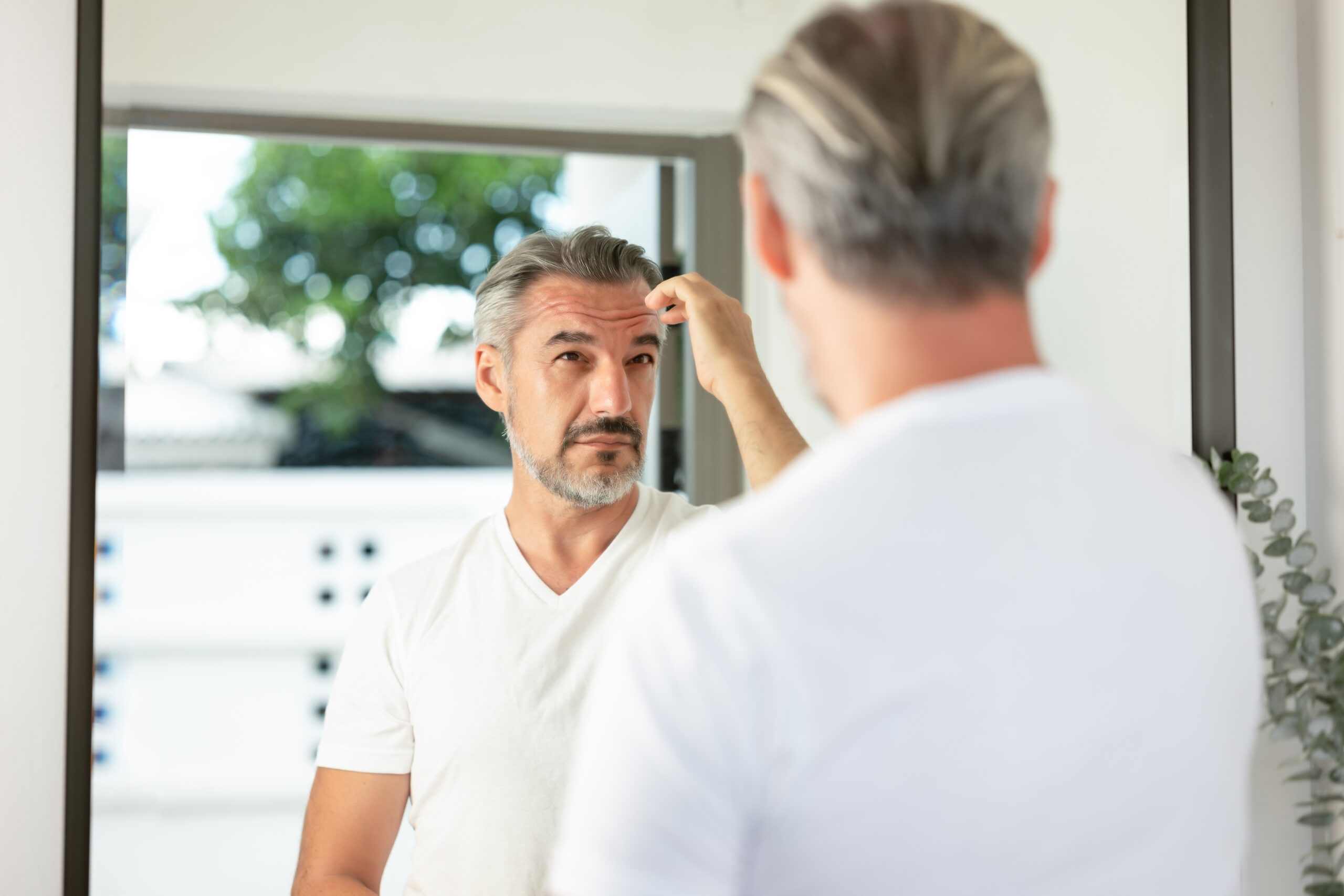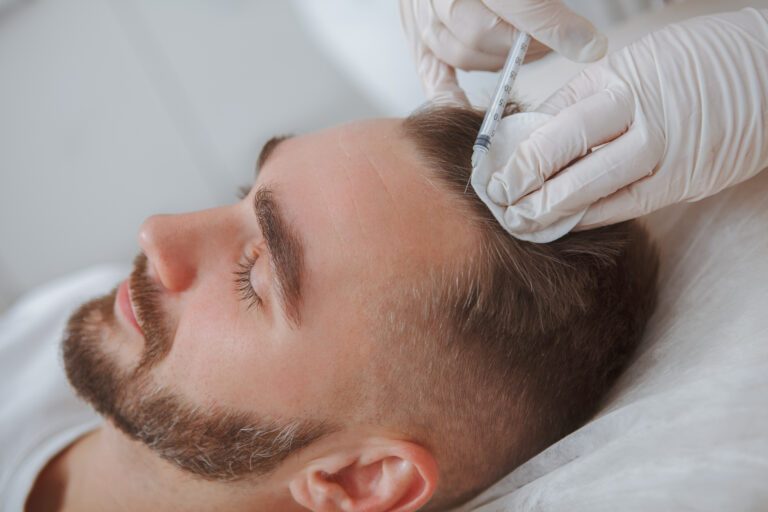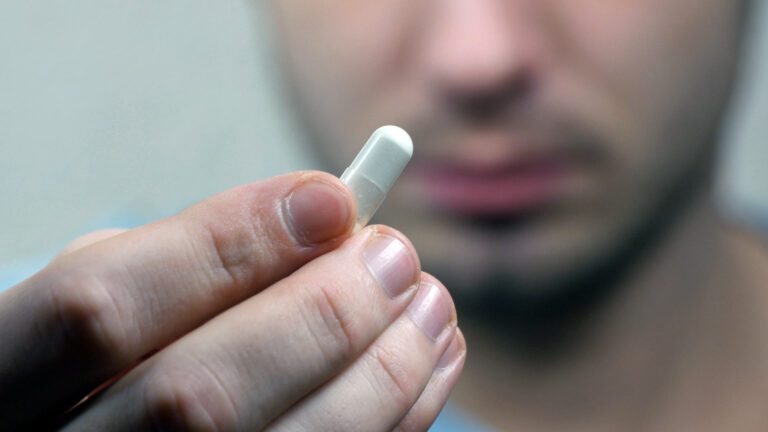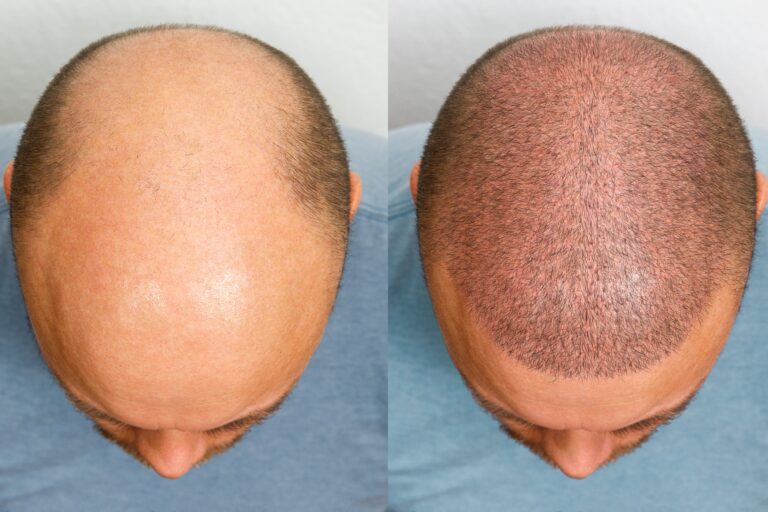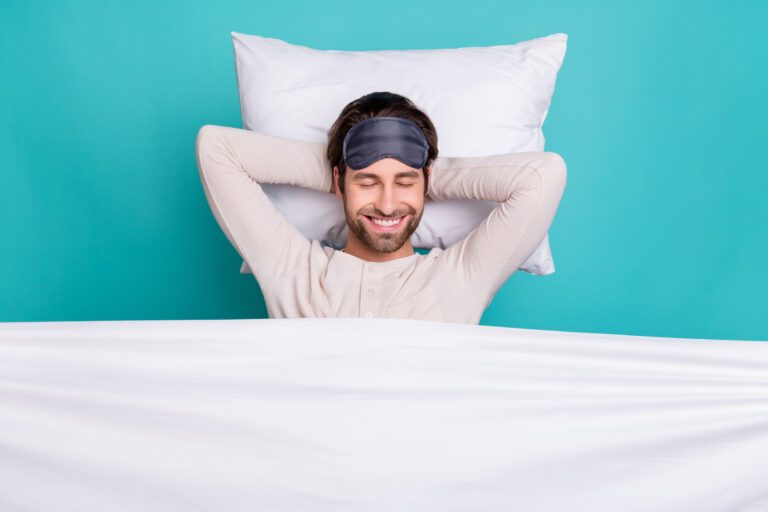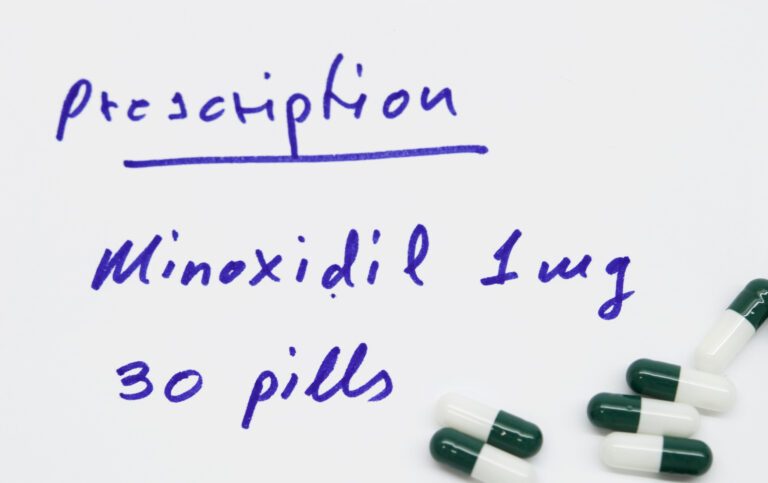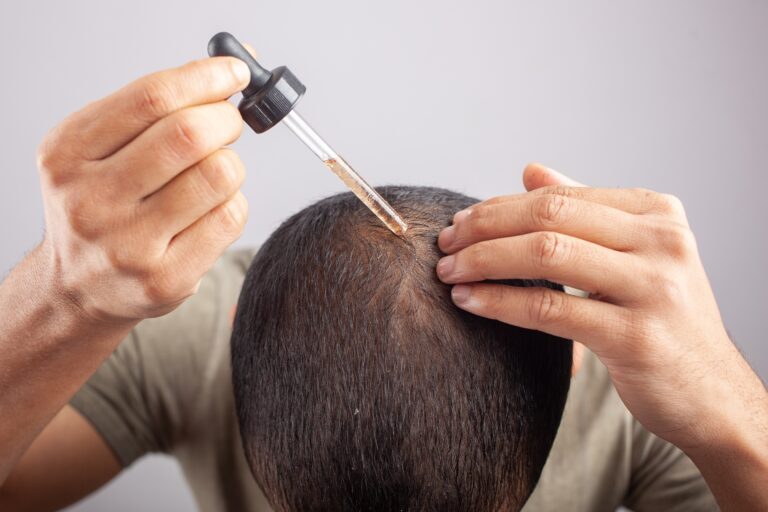Dutasteride for Hair Loss: Everything You Need to Know
Hair loss is an inconvenience no one wants to deal with, and the worst part? It’s getting more common by the minute, affecting more than 50 million men in the US alone. The good news? There are plenty of treatments for the different conditions that cause hair loss.
You likely hear the words minoxidil and finasteride being thrown around a lot, but have you ever heard of dutasteride?
It’s true that minoxidil and finasteride are the only FDA-approved treatments for hair loss, but that doesn’t mean there aren’t other options.
Dutasteride, a drug originally used to treat BPH, is often used off-label to treat hair loss. But is it effective? More importantly, is it safe to use for hair loss since it’s not FDA-approved? That’s what we’re here to explore!
An Overview of Dutasteride for Hair Loss
Dutasteride is a medication used to treat benign prostatic hyperplasia, which is a non-cancerous condition that causes enlarged prostates. It’s sold under the brand name Avodart, and it works by blocking the conversion of testosterone to DHT, a male hormone that causes the prostates to grow.
So, where does hair loss stand here?
Here’s what you probably don’t know: the DHT hormone is responsible for a lot of functions in the human body, mostly related to the sexual development of males. One of these functions is hair growth.
When your body has an excessive response to this hormone, it overstimulates the hair follicles, causing them to shrink and start growing weak and brittle hair. It also shortens the cycle of hair growth, causing further hair loss.
In other words, it causes androgenetic alopecia, which is the primary cause of hair loss globally.
Since dutasteride reduces the production of DHT in your body, it prevents hair loss and allows the hair follicles to heal and start growing healthy hair again.
Is Dutasteride Safe for Hair Loss?
The fact that the FDA hasn’t approved dutasteride as a treatment for hair loss raises a red flag for some users. Though it doesn’t have severe side effects, you still need to practice caution when using it off-label.
The medication may cause scalp irritation, dizziness, cold sweats, and in some rarer cases, it may cause sexual dysfunction and chest pain. However, those are side effects of the oral form of dutasteride. The topical treatment should be safe to use—the most it’ll cause is some redness and scalp irritation if you have sensitive skin or if you misuse it.
Topical dutasteride may also result in a severe allergic reaction in some people, which may lead to swelling of the throat and face, but that’s only if you’re allergic to it.
Having said that, it’s important to note that those side effects are listed for male users. Dutasteride affects women differently, with side effects like weight gain, fatigue, muscle soreness, and reduced sex drive. Besides, pregnant women or those intending to get pregnant soon shouldn’t take it because it causes defects and abnormalities in the fetus.
How Does Dutasteride Prevent Hair Loss?
Dutasteride works in a way similar to finasteride, except it’s more effective, so it’s often used in cases where finasteride doesn’t show progress.
The way it works, it blocks an enzyme called 5-alpha reductase, or 5AR. This enzyme is responsible for catalyzing the conversion of testosterone into DHT, so when it’s blocked, the conversion doesn’t happen, thereby reducing the levels of DHT in your body.
Since DHT is the main culprit behind hair loss, reducing its levels allows your hair follicles to grow healthier hair and stop further shedding.
When DHT levels increase in your body, the follicles in the crown area and the hairline start shrinking, eventually causing baldness on the crown and a receding hairline. With no treatment, the issue can grow to affect all the hair on top of the head.
Dutasteride is highly effective because it targets both isoenzymes of 5AR, Type 1 and Type 2, so it reduces the level of DHT in the body dramatically. It’s estimated to block more than 90% of testosterone’s conversion into DHT.
Having said that, it’s important to note that dutasteride only prevents hair loss, but it doesn’t regrow hair. For that to happen, you’ll have to pair it with another treatment or supplement under the supervision of a doctor.
How Effective Is Dutasteride for Hair Loss?
Dutasteride is highly effective for treating hair loss, perhaps the most effective treatment on the market.
It’s been tested in comparison to finasteride because they work in the same way, and it’s been found that dutasteride has a more potent effect because it targets the two isoenzymes of 5AR. Meanwhile, finasteride only targets one isoenzyme.
This has been further proven by a couple of studies. One study found that dutasteride was more effective than finasteride in treating androgenetic alopecia. Another similar study reached the same conclusion when the hair growth rate was higher in patients who took dutasteride.
One older study on dutasteride showed that patients who consumed 0.5mg of the medication daily for 6 months saw an increased hair count by 12.2/cm2. In the same study, patients who consumed the placebo showed less than half of that count.
How Fast Does Dutasteride Work for Treating Hair Loss?
Everyone responds differently to medications, so you can’t guarantee dutasteride will take a specific period of time to treat your hair loss condition. However, most hair loss treatments start showing significant progress after 3–6 months of consistent use.
You also need at least a year to judge whether dutasteride helped your hair grow back or not. These processes take time, and hair growth can be affected by various other factors like stress, underlying conditions, and age.
All in all, it’s worth noting that dutasteride causes shedding once you start using it. That’s your body getting rid of the miniaturized hairs, so there’s nothing to worry about. The shedding should stop after a while.
Different Consumption Forms of Dutasteride
Dutasteride has three different forms of consumption: as a topical treatment, an oral medication, and a mesotherapy injection.
The oral dosage differs from one person to another according to age, weight, and other factors. But generally, dutasteride is usually prescribed in 0.5mg capsules to be taken once daily or three times weekly. You’d have to consult a professional before taking it to get an accurate prescription.
As for mesotherapy injections, they involve microinjections to the balding areas on the head. Contrary to what it looks like, the process is painless and doesn’t leave any marks, and it’s often administered with local anesthesia to reduce discomfort.
Of course, the injections are applied at a low frequency compared to the oral treatment. You’d only need 2–4 sessions per year. The progress will take some time since it’s a long-term treatment, but it’s a highly efficient form of treatment.
Topical dutasteride is often used once or twice daily, depending on the severity of the problem. You can discuss the matter with a dermatologist to make sure you’re using it correctly.
Dutasteride Vs. Other Hair Loss Treatments
The most common treatments for hair loss are finasteride and minoxidil, and they’re also the only FDA-approved drugs to treat androgenetic alopecia. However, that doesn’t mean they’re the only treatment options.
Let’s see the common hair loss treatments on the market and how they compare to dutasteride:
Minoxidil
Minoxidil is one of the most popular hair loss treatments because it helps the hair grow back in a healthy form. It’s available in both topical and oral forms, but only the topical form is FDA-approved. You can use oral minoxidil to treat hair loss, but you’ll have to get it off-label.
Minoxidil works in an entirely different way than dutasteride. Instead of targeting the DHT synthesis, it increases the blood flow to your hair follicles by dilating the blood vessels. Doing so promotes healthy follicles and helps them grow hair again.
The thing with minoxidil is, it’s not a long-term treatment unless you keep using it. Once you stop using it, the hair may start falling again because it doesn’t treat the underlying cause.
It’s still a pretty effective treatment for hair loss, but comparative studies have shown that oral dutasteride is more effective for treating AGA.
Finasteride
Finasteride is strikingly similar to dutasteride in the way it works. It reduces the levels of DHT in your body by stopping the conversion of testosterone to DHT. It does so by inhibiting the 5AR enzyme that catalyzes the process.
However, it only targets the Type 2 isoenzyme, while dutasteride targets both Type 1 and Type 2. On top of that, dutasteride has a longer half-life, which is the time that the drug needs in your body to reduce by half.
A longer half-life means that dutasteride stays in your body for longer, which further increases its progress.
Finasteride is more common for treating patterned baldness in males because it’s FDA-approved, but dutasteride has shown better effectiveness in treating the cause.
Plenty of studies were carried out to compare the two relatively similar drugs, and most of them reached the conclusion that dutasteride increases hair count more than finasteride.
Is Dutasteride Better or Hair Transplant?
Dutasteride and hair transplants are usually not prescribed for the same cases. Dutasteride is the favored treatment option for pattern baldness that starts at the hairline and crown. Meanwhile, hair transplant is a last resort treatment for an aggressive form of alopecia or total hair loss.
A hair transplant is a complex procedure that includes moving hair from one place to another on the patient’s head in hair grafts. The grafts are then placed into tiny incisions made in the scalp. You don’t usually have to resort to this procedure unless you need to restore your hair.
Dutasteride is a non-invasive treatment that you can use if you’re merely trying to prevent further hair loss and maintain your current hair count.
Frequently Asked Questions About Dutasteride for Hair Loss
Can dutasteride cause hair loss?
It’s unlikely that dutasteride will cause hair loss. You may notice some shedding when you first start administering it. It’s pretty common and it’s actually a sign that the drug is working, but the shedding should stop after a while. Those are the thinning hairs falling to make a place for the new ones.
Does dutasteride regrow hair?
No, contrary to common misconceptions, dutasteride doesn’t regrow hair. It only prevents further hair loss and helps you maintain the current hair count you have. You’d have to use it with other hair growth supplements if you want to regrow hair.
Most people take it with oral minoxidil since minoxidil can repair dormant follicles and encourage them to grow hair again.
Is dutasteride better than minoxidil?
According to a lot of studies, dutasteride is more effective than minoxidil for preventing hair loss, but minoxidil is more effective in repairing hair follicles and regrowing hair because of its vasodilator effect that helps the nutrients reach your follicles faster.
What are the side effects of dutasteride?
Like finasteride, dutasteride is often associated with erectile dysfunction and reduced libido. However, those side effects aren’t that common and only appear with oral treatment. Topical dutasteride may cause mild reactions like redness and itchiness, and in most cases, it doesn’t show any side effects.
Will dutasteride thicken my hair?
Dutasteride will reverse the effects of androgenetic alopecia and prevent further hair loss, but it likely won’t thicken your hair if the follicles are dormant.
Final Thoughts
Dutasteride is a pretty common treatment option for hair loss, but it’s often used off the label because it’s not FDA-approved for this purpose. Despite that, it’s the most effective form of treatment for androgenetic alopecia because it reduces DHT levels in the body by a significant amount.
You can use dutasteride as an oral drug, a topical treatment, or mesotherapy injections, but the latter is the most common form because it shows rapid progress after only a couple of sessions, and it’s not as frequent as topical dutasteride.

